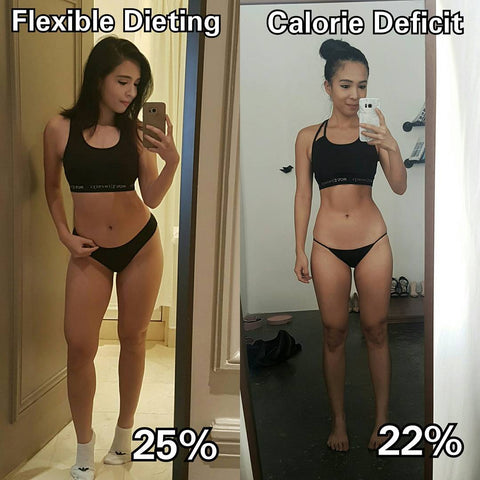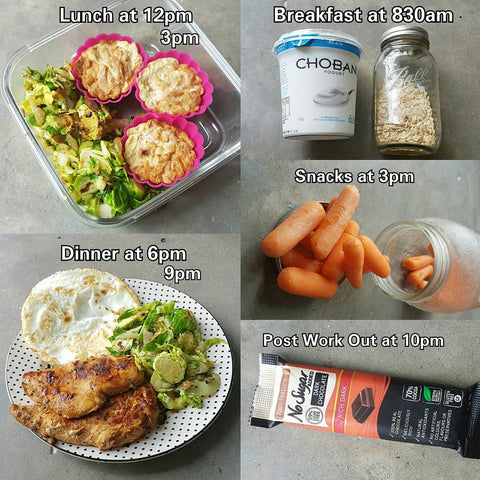The Sparrow
[UPDATED] Why I'm On Calorie Deficit And What It Is
Disclaimer: We do not encourage anyone to be on a calorie deficit diet. This article is written for sharing purposes only and does not serve as a guide. We strongly recommend you consult a physician before beginning a new diet or exercise program.
Hey ladies!
Many of you have messaged me asking about weight loss and most of them come down to these two concerns:
“How do I lose my love handles, muffin tops and jiggly thighs?”
“I just want to lose weight. I don't want to get bulkier.”
Now, I want to tell you that if you try to lose weight by doing light exercises, such as cardio, dance, and resistance training, and couple that with a low-carb, low-sugar, low-calories, low-protein and low-everything diet, you will be able to see results fast.
But it is not going to sustain.
I no longer want to force myself to stick to a strict diet and end up binging, again and again. In my current training and diet plan, I don't binge. I make sure I eat enough every single day, even though I'm on a calorie deficit diet.

My body fat percentage: Flexible Diet vs Calorie Deficit Diet
So what is a calorie deficit diet?
Calorie deficit is when you burn more calories than you put into your body.
For example, if you burn 2,500 calories per day but only eat 2,000, you have a deficit of 500 calories. When you eat more than you burn, your body stores the extra energy as fat but when you eat less than you burn, you create a calorie deficit.
That’s when your body is forced to burn that stored fat to give you the energy you need. This leads to weight loss.
What is your calorie maintenance level?
Before you go on a calorie deficit diet, you need to know your calorie maintenance level. This is the level at which your weight maintains, because you are consuming and burning the same number of calories.
Everyone’s calorie maintenance levels are different because we are all different! Not everyone with a certain goal or body type has the same maintenance level. That means, not everyone should eat or burn the same amount of calories. So don’t compare yourself to that person who is eating or exercising more or less than you.
Your calorie maintenance level is dependent on many factors including gender, height, weight, age, activity level, metabolic rate, and thermic effect of food.
You can calculate it here.
Keep in mind that while these calculations can be quite accurate, they are still just an estimate.
Why is it important?
Once you've found your calorie maintenance level, you can then determine how much you should eat or burn to reach your goal. This is important.
If your goal is to lose weight, ideally, you should be consuming about 20% below your maintenance level each day. For example:
If you wanted to lose weight and had a daily calorie maintenance level of 2500 calories, you would need to create a caloric deficit of 500 calories each day. This is because 20% of 2500 is 500 (2500 x 0.20 = 500). This means eating 2000 calories per day.
Never overdo it.
Yes, to lose fat, you need to be below your calorie maintenance level, but I want to stress that you should never go too low and expect fast results. This is a journey, and if you want it to be long-term, take it step by step.
Once I know how many calories I should consume and burn to reach my goals, I need to track it each day. I use the MyFitnessPal app to help me with this. It’s free and quite easy to use but any calorie calculator or app can do this. Remember, these calculators give just an estimate so use them as a rough guide only.
As a standard, for a one-pound-per-week rate of weight loss, we need to create a calorie deficit of 500 calories per day by eating 250 calories less than we usually need to maintain our weight, and burning off the other 250 calories through exercise.
Eat more. Eat right. Not less.
When it comes to eating, I don’t just limit my portion sizes and eat less. I actually eat more often, to prevent myself from getting hungry. I also make sure I eat right. This means, I choose healthy. For example, whole grains like oats, vegetables and lean protein. Like my favourite, chicken breast.
When I really feel like a treat, I look for healthier alternatives. There are a whole bunch in the market like QuestBars and granola. Just make sure you read the nutrition labels to see what you're putting into your body and don't go overboard. This is where the sacrifice and discipline comes in.
Try to stay away from foods with empty calories. That means, those that are high in calories but low in nutrients. You know, the ones that are so hard to resist, like sweets, chocolate chip cookies, potato chips and most processed foods. When you fill yourself up with a lot of carbs from these foods, you might create a calorie deficit and lose weight, but you'll lose up to 50% of that weight in muscle.

What I eat in a day
MOVE when you can.
If you don’t want to sacrifice your food intake too much, exercise. Try moving, whenever you can. Start with what you are comfortable with, be it walking 30 minutes a day, yoga, dance or swimming. If you can fit in more, do so. This will also boost your energy! For me, I do weight lifting. When I’m able to lift heavily, I can really feel the excitement inside me. It makes me feel good.
This also depends on your goal. My goal is to be strong and lean. When in calorie deficit, cardio will help with fat loss, yes, but weightlifting will make you leaner.
Remember, there are a lot of ways for fat loss. This is just my plan at the moment because it helps me reach my goal. Calorie deficit is a choice and it might not be right for you.
Love,
Sherlyn
For motivation to get you breaking your limits...





Only your panty has gotten smaller.
I imagine you wearing no panty when you go to 20% body fat.
How ridiculous.
A caloric deficit is any shortage in the amount of calories consumed relative to the amount of calories required for maintenance of current body weight . This article will tell how you can achieve the calorie deficit by using Unified Food Powder and lose weight sustainably and healthily.
calorie deficit